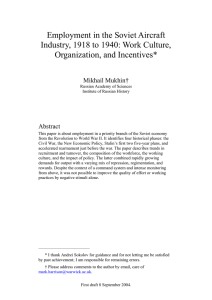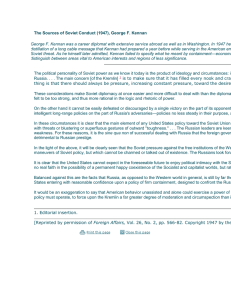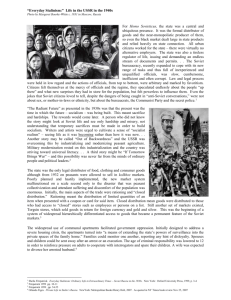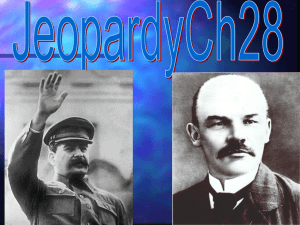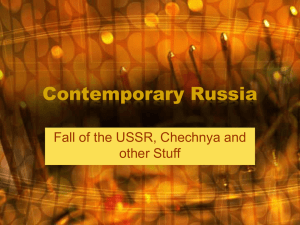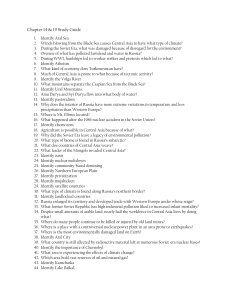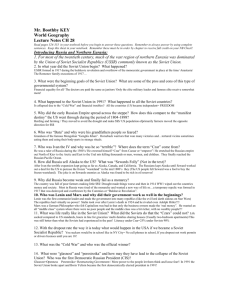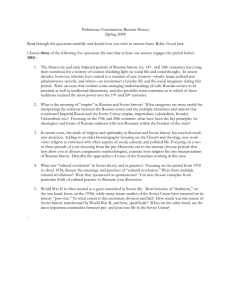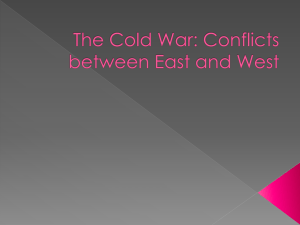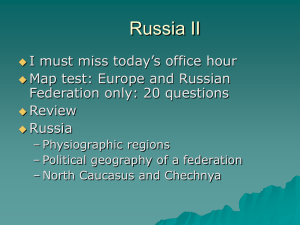File - Mr. Stoller20th CenturyAmerican History
advertisement
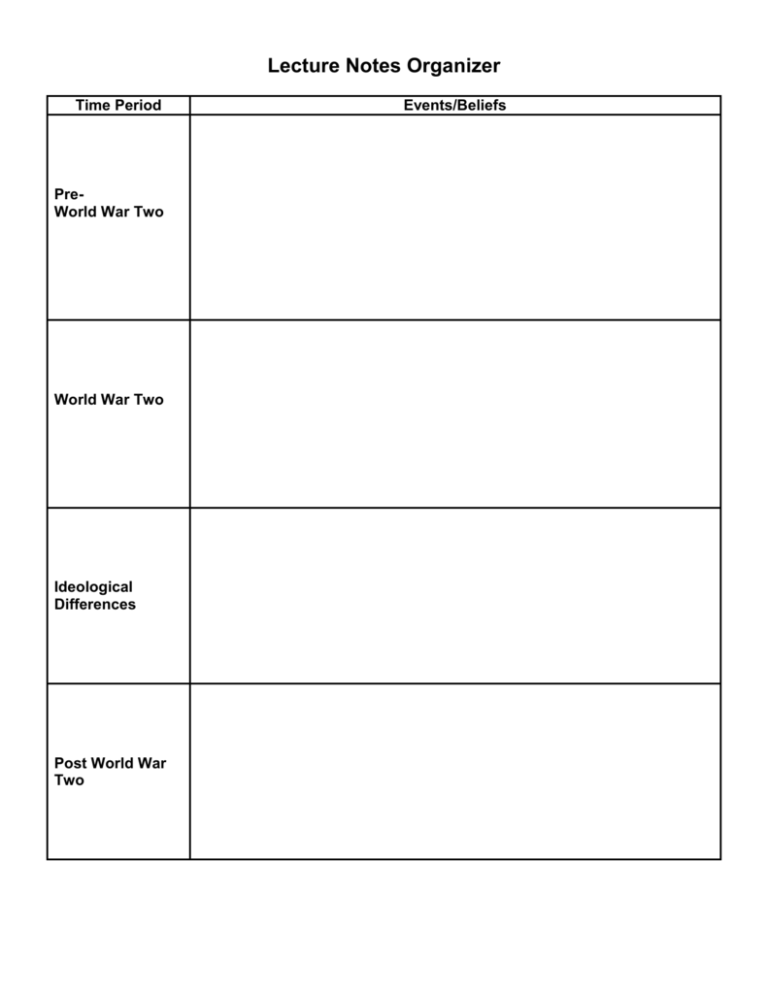
Lecture Notes Organizer Time Period PreWorld War Two World War Two Ideological Differences Post World War Two Events/Beliefs Source 1 . . . . We cannot be blind to the fact that the liberties enjoyed by individual citizens throughout the United States and throughout the British Empire are not valid in a considerable number of countries, some of which are very powerful. In these States control is enforced upon the common people by various kinds of all-embracing police governments to a degree which is overwhelming and contrary to every principle of democracy. The power of the State is exercised without restraint, either by dictators or by compact oligarchies operating through a privileged party and a political police. It is not our duty at this time when difficulties are so numerous to interfere forcibly in the internal affairs of countries which we have not conquered in war, but we must never cease to proclaim in fearless tones the great principles of freedom and the rights of man which are the joint inheritance of the English-speaking world and which through Magna Carta, the Bill of rights, the Habeas Corpus, trial by jury, and the English common law find their most famous expression in the American Declaration of Independence. All this means that the people of any country have the right, and should have the power by constitutional action, by free unfettered elections, with secret ballot, to choose or change the character or form of government under which they dwell; that freedom of speech and thought should reign; that courts of justice, independent of the executive, unbiased by any party, should administer laws which have received the broad assent of large majorities or are consecrated by time and custom. Here are the title deeds of freedom which should lie in every cottage home. Here is the message of the British and American peoples to mankind. Let us preach what we practice -- let us practice what we preach. . . . . A shadow has fallen upon the scenes so lately light by the Allied victory. Nobody knows what Soviet Russia and its Communist international organization intends to do in the immediate future, or what are the limits, if any, to their expansive and proselytizing tendencies. I have a strong admiration and regard for the valiant Russian people and for my wartime comrade, Marshall Stalin. There is deep sympathy and goodwill in Britain -- and I doubt not here also -- towards the peoples of all the Russias and a resolve to persevere through many differences and rebuffs in establishing lasting friendships. We understand the Russian need to be secure on her western frontiers by the removal of all possibility of German aggression. We welcome Russia to her rightful place among the leading nations of the world. We welcome her flag upon the seas. Above all, we welcome, or should welcome, constant, frequent and growing contacts between the Russian people and our own people on both sides of the Atlantic. It is my duty however, for I am sure you would wish me to state the facts as I see them to you. It is my duty to place before you certain facts about the present position in Europe. From Stettin in the Baltic to Trieste in the Adriatic an iron curtain has descended across the Continent. Behind that line lie all the capitals of the ancient states of Central and Eastern Europe. Warsaw, Berlin, Prague, Vienna, Budapest, Belgrade, Bucharest and Sofia, all these famous cities and the populations around them lie in what I must call the Soviet sphere, and all are subject in one form or another, not only to Soviet influence but to a very high and, in some cases, increasing measure of control from Moscow. Athens alone -- Greece with its immortal glories -- is free to decide its future at an election under British, American and French observation. The Russian-dominated Polish Government has been encouraged to make enormous and wrongful inroads upon Germany, and mass expulsions of millions of Germans on a scale grievous and undreamed-of are now taking place. The Communist parties, which were very small in all these Eastern States of Europe, have been raised to pre-eminence and power far beyond their numbers and are seeking everywhere to obtain totalitarian control. Police governments are prevailing in nearly every case, and so far, except in Czechoslovakia, there is no true democracy. . . . --- Winston Churchill presented this speech at Westminster College in Fulton, Missouri on March 5, 1946. Source: Churchill, Winston S. "Iron Curtain Speech." Fulton, MO. 5 Mar. 1946. Internet Modern History Sourcebook. Fordham University. 17 April 2010 <http://www.fordham.edu/halsall/mod/churchill-iron.html>. Source 2 In summary, we have here a political force committed fanatically to the belief that with US there can be no permanent modus vivendi, that it is desirable and necessary that the internal harmony of our society be disrupted, our traditional way of life be destroyed, the international authority of our state be broken, if Soviet power is to be secure. . . . In addition, [Soviet power] has an elaborate and far-flung apparatus for exertion of its influence in other countries, an apparatus of amazing flexibility and versatility, managed by people whose experience and skill in underground methods are presumable without parallel in history. . . . But I would like to record my conviction that the problem is within our power to solve - and that without recourse to any general military conflict. And in support of this conviction there are certain observations of a more encouraging nature I should like to make: 1. Soviet power, unlike that of Hitlerite Germany, is neither schematic nor adventuristic. It does not work by fixed plans. It does not take unnecessary risks. Impervious to logic of reason, and it is highly sensitive to logic of force. For this reason it can easily withdraw - and usually does - when strong resistance is encountered at any point. Thus, if the adversary has sufficient force and makes clear his readiness to use it, he rarely has to do so. If situations are properly handled there need be no prestigeengaging showdowns. 2. Gauged against Western world as a whole, Soviets are still by far the weaker force. Thus, their success will really depend on degree of cohesion, firmness, and vigor which Western world can muster. . . . For these reasons I think we may approach calmly and with good heart the problem of how to deal with Russia. . . . 1. Our first step must be to apprehend . . . the nature of the movement with which we are dealing. We must study it with the same courage, detachment, objectivity, and the same determination not to be emotionally provoked or unseated by it, with which a doctor studies unruly and unreasonable individuals. 2. We must see that our public is educated to realities of Russian situation. . . . I am convinced that there would be far less hysterical anti-Sovietism in our country today if the realities of this situation were better understood by our people. . . . It may also be argued that to reveal more information on our difficulties with Russia would reflect unfavorably on Russian-American relations. . . But I cannot see what we would be risking. . . . 3. Much depends on health and vigor of our own society. World communism is like malignant parasite which feeds only on diseased tissue. . . . 4. We must formulate and put forward for other nations a much more positive and constructive picture of the sort of world we would like to see than we have put forward in the past. . . . 5. Finally, we must have courage and self-confidence to cling to our own methods and conceptions of human society. After all, the greatest danger that can befall us in coping with this problem of Soviet communism is that we shall allow ourselves to become like those with whom we are coping. Telegram: The Charge in the Soviet Union (Kennan) to the Secretary of State. SECRET. From Moscow, February 22, 1946--9 p.m. [Received February 22--3: 52 p.m.] Source: “George Kennan’s ‘Long Telegram.’” Feb. 22, 1946. National Security Archives. George Washington University. 17 April 2010 <http://www.gwu.edu/~nsarchiv/coldwar/documents/episode-1/kennan.htm>. About/Point Chart Title : Author: The text is ABOUT: The Author’s POINTS are: Describe the context of the writing, including what was going on in the United States and for whom the article was delivered.
